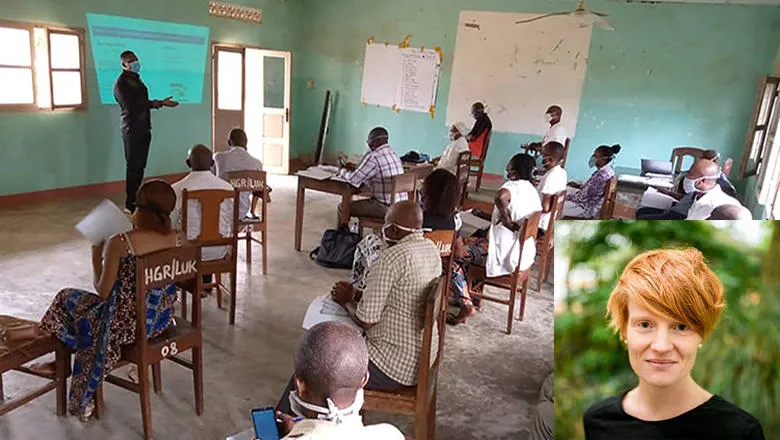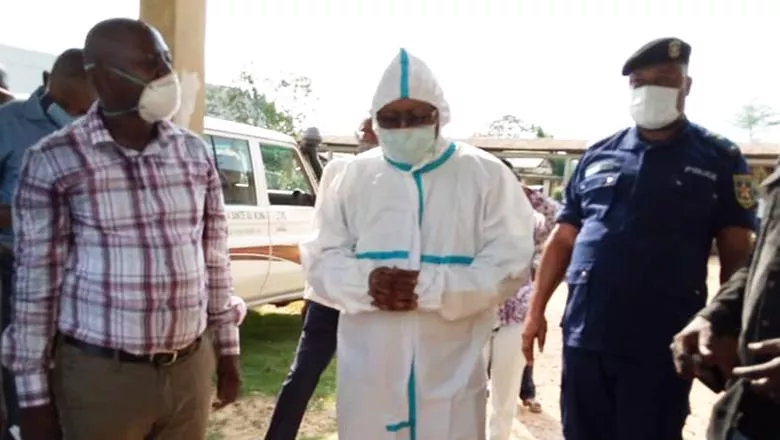I feel tremendously privileged to be able to contribute to improving health outcomes both in the NHS and in the DRC. I had hoped to have a career that bridged these worlds and am so grateful that I am able to do that, especially at a time when global solidarity has never been more important.
Elizabeth Khadija Tissingh (Medicine, 2008)
10 July 2020
'Giving to others - in whatever form you choose - is part of what it means to be human.'
How alumna Dr Elizabeth Khadija Tissingh and King’s are #ContinuingToServe by supporting the Democratic Republic of the Congo in fighting the COVID-19 pandemic.

The pressures of COVID-19 on health systems in Europe has somewhat lessened, though across the world, hospitals, health workers and medical infrastructure continue to be stretched. Cases of the virus are rising and the capacity to provide critical care is amongst the lowest in the world in countries such as the Democratic Republic of the Congo (DRC). This latest crisis is happening at the same time as an Ebola outbreak, a measles epidemic and on-going conflict in the East of the country. Perversely then, because of these challenges, the DRC does have experience of managing epidemics in difficult circumstances and committed healthcare professionals.
As part of the King’s Global Health Partnerships (KGHP), King’s works with the Ministry of Health in the Kongo Central province in the DRC. Lead by alumna and NHS surgeon Elizabeth Khadija Tissingh, King’s Kongo Central Partnership (KKCP) was initially set up to improve health outcomes in trauma. Liz normally combines working for the NHS in orthopaedics with the Congolese partnership. With this crisis emerging and elective surgery cancelled, she is now urgently working with Congolese colleagues, including the government, hospitals and the World Health Organisation, to support the response to the pandemic in the Kongo Central province and help save lives.
‘We have re-directed our energy to support the acute needs in preparing hospitals and clinicians to manage COVID-19 patients’ she says. ‘We have developed a programme to train doctors who will be working at six dedicated COVID-19 treatment centres in clinical case management. We’ve also supported the delivery of PPE and other vital supplies to health centres. We hope that investments we make now in managing this outbreak will offer long term benefits and strengthen the health system for the future.’
Liz graduated from King’s in 2008 and says: ‘My time at King’s – my fellow students, teachers, patient encounters, the city of London - all helped me make sense of my diverse background, gave me a sense of belonging and crystallized what sort of person and what sort of clinician I wanted to be.’
Reflecting on the effect of this pandemic Liz says:
‘I think it has brought into sharp relief the things in our society and the things in our healthcare system that are weak and need to change. It has brought out the best in many people but has also shown where our leadership is weak and where our systems are lacking. I hope that there will be a period of reflection and that we are able to keep the good but implement change in areas where it is desperately needed.’
Liz is just one of the many alumni who are living out King’s ethos of service. Read more #ContinuingToServe stories here.
For me I have never really considered ‘service’ as being something optional or something separate from the rest of life. Life is at its best when it is lived and shared with others; giving to others - in whatever form you choose - is part of what it means to be human.
Elizabeth Khadija Tissingh (Medicine, 2008)
Liz’s work was recognised in 2019 when she won the King’s Distinguished Alumni Award for contribution to Global Health. She is also involved in the Global Surgery MSc at King's.

